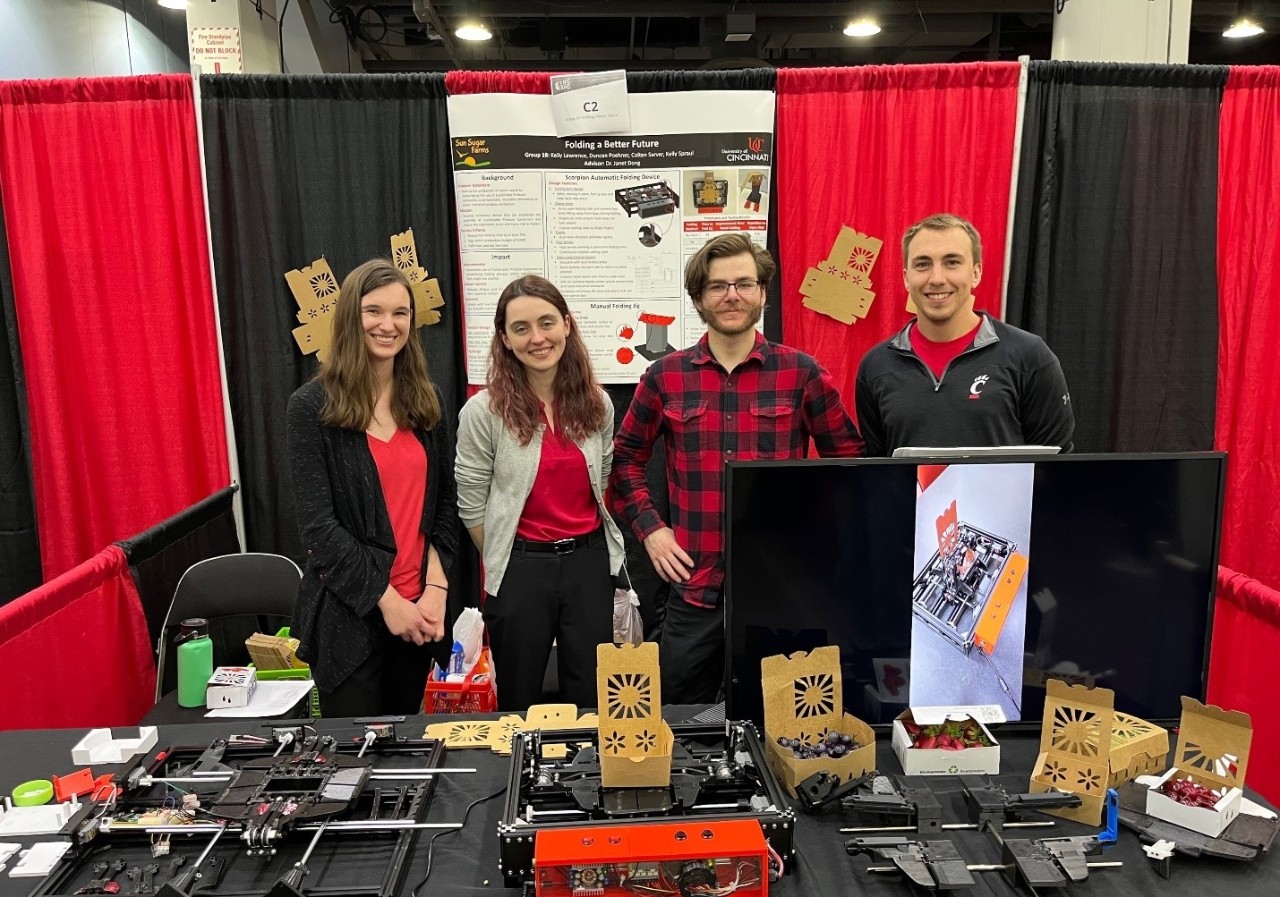
UC students engineer cutting-edge box folding device
Next-generation sustainable packaging designed through College of Engineering and Applied Science
A group of innovative students at the University of Cincinnati has unveiled its remarkable creation — the Scorpion, a box-folding device — as part of a capstone project.
The UC Center for Robotics Research, led by Janet Jiaxiang Dong, professor in the Department of Mechanical and Materials Engineering and adviser of the student team/project in the College of Engineering and Applied Science (CEAS), received a request from Sun Sugar Farms, which markets reusable crate systems and recyclable, biodegradable produce containers.
Owner Linda Fritz reached out to the center for help with a unique challenge — designing an affordable automated folding device that small-scale produce farmers could use with her company’s packaging.
Dong presented the sponsored challenge to her students, who eagerly accepted the task as part of their capstone project. Kelly Lawrence, Duncan Poehner, Colton Sarver and Kelly Spraul were the team members.
This project and the student team set a great example for our missions and the collaboration between UC and the local community.
Janet Jiaxiang Dong Professor
The design process
Combining their engineering skills and entrepreneurial spirit, team members examined samples of boxes to be folded. They also researched the mechanisms of commercially available machines, which can cost upwards of $100,000. One of the manufacturers spoke with the team, offering valuable insights into how box folders work.
The team put their skills to the test:
- Poehner, with his background in electricity generation and power plants
- Spraul, who works with large air compressors and industrial control boxes
- Sarver, who specializes in additive manufacturing and design, plus anything involving 3D printing
- Lawrence, with computer-aided design skills, including 3D modeling and drawing
The students created several iterations of an automated folding device. Each version served as an incremental contributor to the creative process.
One major challenge they faced was controlling the four sides of the mechanism to consistently perform various actions of folding upwards within tight tolerances.
How it works
The final prototype uses four electric servo motors to fold large boxes efficiently. The mechanism curls and wraps around like a tail, earning the name Scorpion.
“At UC, as a higher education institute, one of our missions is to train and educate the next generation of engineers to be able to solve real-world problems and serve the local community," Dong said. "This project and the student team set a great example for our missions and the collaboration between UC and the local community.”
Dong also highlighted the impact of such a project:
- Helps small farmers to grow their business by using automation to replace human labor
- Can increase productivity and potentially reduce workers’ injuries
- Enables more small growers to use environmentally friendly boxes versus plastic boxes
“I was thrilled that the concept I was hoping for had been created — robotic-type arms folding the flat carton into its box shape," said Fritz, who initially proposed the project. "It was an ingenious design by these UC students and exciting to see. I could tell a lot of thought and work had gone into it.”
The Scorpion king
The team worked at an accelerated pace of four months to enter the Scorpion at the CEAS Expo, where graduating seniors present their capstone projects. With its chela-like mechanism, the Scorpion was king.
First place at the Expo was awarded to the Scorpion team in the category of Product and Device. The Department of Mechanical and Materials Engineering also presented an award to the team for Most Complex Device.
The team sums up their experience this way:
“We all had different strengths, but we didn't isolate parts of the project because of it. We've created an incredibly more economical solution to a complex problem, making it much more accessible to these farmers to use the sustainable produce containers from Sun Sugar Farms that are better for the environment. The option of a device that costs 90 times less than commercially manufactured box folding mechanisms creates a path for small farmers who are more likely to use this advanced, sustainable alternative," Team Scorpion said in a statement.
Featured image at top: The Scorpion folding device team. From left, Kelly Lawrence, Kelly Spraul, Colton Sarver and Duncan Poehner. Photo provided
Become a Bearcat
Whether you’re a first-generation student or from a family of Bearcats, UC is proud to support you at every step along your journey. We want to make sure you succeed — and feel right at home.
Related Stories
From research to resume: Grad Career Week prepares students for career paths
February 20, 2026
Graduate students at the University of Cincinnati will explore how their academic and creative work translates into professional success during Grad Career Week, March 2–6, a week-long series of workshops, networking opportunities, and skill-building sessions hosted by the Graduate College.
Discovery Amplified expands research, teaching support across A&S
February 19, 2026
The College of Arts & Sciences is investing in a bold new vision for research, teaching and creative activity through Discovery Amplified. This initiative was launched through the Dean’s Office in August 2024, and is expanding its role as a central hub for scholarly activity and research support within the Arts & Sciences (A&S) community. Designed to serve faculty, students, and staff, the initiative aims to strengthen research productivity, foster collaboration, and enhance teaching innovation. Discovery Amplified was created to help scholars define and pursue academic goals while increasing the reach and impact of A&S research and training programs locally and globally. The unit provides tailored guidance, connects collaborators, and supports strategic partnerships that promote innovation across disciplines.
Blood Cancer Healing Center realizes vision of comprehensive care
February 19, 2026
With the opening of research laboratories and the UC Osher Wellness Suite and Learning Kitchen, the University of Cincinnati Cancer Center’s Blood Cancer Healing Center has brought its full mission to life as a comprehensive blood cancer hub.
